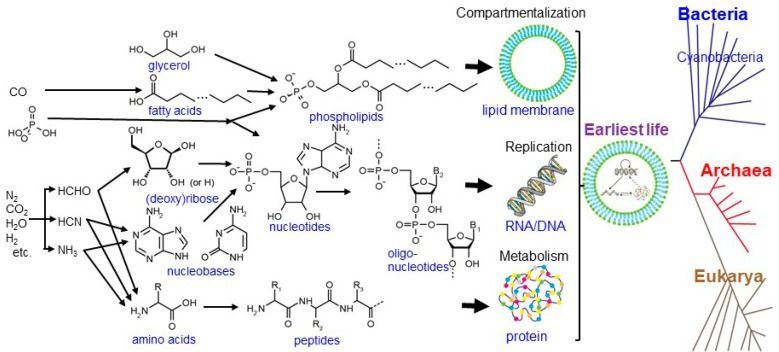Scientists today are quick to point out that they are still basing their models on life as we know it: Carbon-based and reliant on organic compounds and water…
In 2001, the first author (S.N.) led the publication of a book entitled “Geochemistry and the origin of life” in collaboration with Dr. Andre Brack aiming to figure out geo- and astro-chemical processes essential for the emergence of life. Since then, a great number of research progress has been achieved in the relevant topics from our group and others, ranging from the extraterrestrial inputs of life’s building blocks, the chemical evolution on Earth with the aid of mineral catalysts, to the fossilized records of ancient microorganisms. Here, in addition to summarizing these findings for the origin and early evolution of life, we propose a new hypothesis for the generation and co-evolution of photosynthesis with the redox and photochemical conditions on the Earth’s surface. Besides these bottom-up approaches, we introduce an experimental study on the role of water molecules in the life’s function, focusing on the transition from live, dormant, and dead states through dehydration/hydration. Further spectroscopic studies on the hydrogen bonding behaviors of water molecules in living cells will provide important clues to solve the complex nature of life.
Keywords: building blocks, biopolymers, polymerization, extraterrestrial inputs, mineral surfaces, metabolism, photosynthesis, water, hydrogen bonding (9: 3–10)
Life is generally characterized by the following three functions [1]: metabolism: the ability to capture energy and material resources, staying away from thermodynamic equilibrium, replication: the ability to process and transmit heritable information to progeny, and compartmentalization: the ability to keep its components together and distinguish itself from the environment. These functions are operated by biopolymers such as proteins, DNAs, RNAs, and phospholipids ( Figure 1 ). Proteins are made of amino acids linked together by peptide bonds. DNAs and RNAs are made of nucleotides (composed of (deoxy)ribose and nucleobases) bound by phosphodiester linkages. Phospholipids are made of two fatty acids esterified to a glycerol phosphate molecule.







